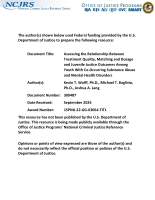Exploring How Prison-Based Drug Rehabilitation Programming Shapes Racial Disparities in Substance Use Disorder Recovery
Journal
Social Science & Medicine
Date Published
February 2018
Agencies
NIJ-Sponsored
Publication Type
Research (Applied/Empirical)





